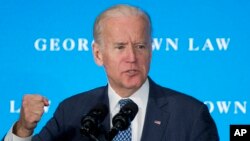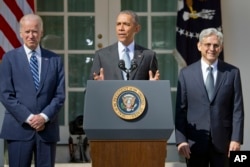The Obama administration redoubled its push to confirm Supreme Court nominee Merrick Garland as a new opinion poll showed 62 percent of Americans think the Senate should vote on the nomination, rather than leaving the high court seat vacant until a new president is sworn in next year.
"Chief Judge Garland deserves a hearing, just as a simple matter of fairness," said Vice President Joe Biden in an address Thursday at Georgetown University's law school. "But it's also a matter of the Senate fulfilling its Constitutional duty."
The vice president sought to clarify words he uttered more than two decades ago that Republicans today call the "Biden rule" — that no Supreme Court nominee be confirmed for a vacancy that arises during a presidential election year.
"Republicans today have been quoting selectively from the remarks that I made in an attempt to justify refusing Chief Judge Garland a fair hearing and a vote on the floor of the Senate," Biden said Thursday.
In a 1992 speech on the Senate floor, Biden, who was chairman of the Judiciary Committee at the time, argued that then-President George H.W. Bush should forgo a Supreme Court nomination if a vacancy arose in the last year of his term. Those remarks have been Exhibit A in Republican talking points against holding confirmation hearings for Garland.
On Thursday, Biden noted that his 1992 speech also included a promise to consider any moderate, consensus nominee that Bush might put forward, and that no Supreme Court pick was ever denied Senate consideration during his tenure on the Judiciary Committee.
"Every nominee was greeted by committee members. Every nominee got a committee hearing," Biden said. "And every nominee, including Justice [Anthony] Kennedy in an election year, got an up-or-down vote."
"There is no Biden rule," the vice president added.
Republican response
Republicans immediately dismissed Biden's assertions.
"Spin away, Mr. @VP, but the #BidenRule says no #SCOTUS confirmation in a presidential election year," tweeted Republican Senator Thom Tillis.
"VP Biden previously said a campaign-year #SCOTUSnominee would hurt the institution of the #Senate. Now says the opposite," tweeted a spokesman for Senate Majority Leader Mitch McConnell.
Delivering the Republican response to President Barack Obama's weekly radio address Saturday, Tillis said the Senate is constitutionally empowered to confirm, reject or withhold consideration entirely of presidential nominees.
"This is about principle, not the person the president has nominated," he said. "The Senate is doing its job and fulfilling its constitutional obligation by deferring consent in order to let the people's voice be heard."
Garland is chief judge of the federal appeals court in the nation's capital. Obama nominated him last week to fill the vacancy created by the death of arch-conservative Supreme Court Justice Antonin Scalia in February.
Public opinion polls have consistently found majority backing for Senate action this year.
In the latest survey, by Quinnipiac University, 62 percent of American voters said the Senate should consider the Garland nomination, with 33 percent saying the chamber should wait until there is a new president.
Until a new justice is confirmed, the Supreme Court will operate with eight members — possibly deadlocking four-to-four on major decisions.
"The American people deserve a fully staffed Supreme Court of nine, not one disabled and divided. One that is able to rule on the great issues of the day," Biden said.
Scalia served on the court for nearly 30 years and was part of the dominant five-member conservative bloc of justices. Court analysts say that Garland would likely push the court to more liberal rulings on a variety of issues.
VOA's Ken Bredemeier contributed to this report.





